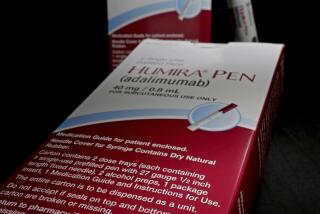Demand for Generic Drugs Offers Huge Profit Potential
- Share via
Patents on a rainbow of branded drugs will expire in the next five years, promising a pot of profits for makers and marketers of generic drugs.
The merger announced Monday between the generic-drug giant Ivax Corp. of Miami and the behemoth distributor Bergen Brunswig Corp. exemplifies steps being taken by companies throughout the industry to get ready to reap the rewards.
The intensifying pressures throughout the health-care industry have triggered demands for these lower-cost generic clones, which can also generate higher profit margins for distributors and druggists than brand-name drugs.
Over the next five years, patents will expire on 43 branded drugs that each generate sales of $50 million or more annually for their manufacturers, clearing the way for scores of lower-cost copycats. Generic drugs sell for half the price or less of the brand.
“The amount of [prescription drugs] moving from brand to generic over the next five years is huge--estimated to be $20 billion a year,” said Robert E. Martini, chairman of Orange-based Bergen. Even with steep price discounts on sales of generic drugs, Martini said, that translates to about $7 billion in annual sales.
However, consumer advocates have qualms about how generics will be marketed to patients. While advocates welcome the opportunity to buy quality medicines at cheaper prices, they worry that consolidations among drug makers, wholesalers and managed-care companies could limit the patients’ access to the best care.
The generic industry was launched nationwide in 1984 when the federal government permitted makers of generic drugs to start developing clones two years before the patent on the brand expired.
With cost pressures from health-care insurers and other payers intensifying in recent years, the generic industry entered a “boom stage,” says analyst David Saks of Gruntal & Co. in New York.
Annual U.S. sales of all prescription drugs amount to $70 billion, with generics accounting for about $6 billion of that, Saks said. Over the next five years, he expects generic sales to double as patents expire on drugs with huge markets.
For low-margin distributors like Bergen, the potential for profit growth in the generic field is enticing. If its merger with Ivax proceeds, Bergen estimates that it would reap higher profits on the $2 billion worth of generic drugs it sells annually. Martini said he believes that the combined company, BBI Healthcare Corp., could manufacture half these generics.
In addition, the companies expect that Ivax sales across the U.S. could jump from $350 million to $1 billion by being marketed through Bergen’s distribution network.
In fact, the prospects for growth in the generic industry surely prompted Ivax shareholders Tuesday to question whether the company should shop for a higher bid than it received from Bergen.
Under terms of the $1.4-billion merger, Ivax shareholders would receive less than the price of the stock last Friday.
More to Read
Inside the business of entertainment
The Wide Shot brings you news, analysis and insights on everything from streaming wars to production — and what it all means for the future.
You may occasionally receive promotional content from the Los Angeles Times.










